|
 I
first became familiar with
Joanna Connor in
the late ’80s, on the heels of her debut release
for Blind Pig. She was a powerful guitarist and
vocalist back in those days and has only
improved over time. After several releases with
Blind Pig, she signed with Ruf Records (the
second artist to do so), and later with M.C.
Records after deciding to stick close to the
Windy City to raise her kids in the early
2000s, also serving as the resident band for
the House of Blues and the Kingston Mines. I
first became familiar with
Joanna Connor in
the late ’80s, on the heels of her debut release
for Blind Pig. She was a powerful guitarist and
vocalist back in those days and has only
improved over time. After several releases with
Blind Pig, she signed with Ruf Records (the
second artist to do so), and later with M.C.
Records after deciding to stick close to the
Windy City to raise her kids in the early
2000s, also serving as the resident band for
the House of Blues and the Kingston Mines.
In 2019, one of Connor’s performance videos
caught the attention of Joe Bonamassa and
director Adrian Lynne, who cast her in a scene
performing in his movie "Deep Water." Meanwhile, Bonamassa signed Connor to his KTBA Records
label, where she released the acclaimed 4801
South Indiana in 2021.
Now with the Gulf Coast Records label, Connor
has recently issued Best of Me, a powerful set
featuring her with her band (Shaun Gotti Calloway
– bass, Jason “J Roc” Edwards – drums/background
vocals, Curtis Moore, Jr. – keyboards, Dan
Souvigny – rhythm guitar/keys), along with
guests Bonamassa, Gulf Coast label head Mike
Zito, Josh Smith, Gary Hoey, Jason Ricci, David
Abbruzzese, and the Grooveline Horns.
The funky “House Rules” leads off the album, a
deep slice of blues and funk with Connor’s
fierce slide guitar front and center along with
stellar support from the horns. The mid-tempo
“Pain and Pleasure” is a soul ballad that
features Smith on guitar. Connor’s vocals are
spot-on and she offers more tasty slide guitar
work as well.
The title track has a smooth
gospel/soul feel as Connor testifies, both
vocally and on guitar, to the power of love, and
“Highway Child” is a crisp country-flavored
blues with Connor and Bonamassa trading licks.
“I Lost You” is a superb slow blues, as Connor
turns in a marvelous vocal performance and her
guitar work is equally intense.
“Two of a Kind”
is an upbeat, funky R&B track showcasing the
horns and the rhythm section, and “All I Want Is
You” is a tasty track with a retro R&B feel.
Connor’s cover of Robert Geddins and K.C.
Douglas’ “Mercury Blues” features searing slide
guitar and propulsive drumming from Pearl Jam
alum Abbruzzese, and Zito adds guitar to the
soulful rocker “Shadow Lover.”
The ballad “Greatest of These” is a pointed look
at current events that resounds with hope for a
change in the future. The closer is “Shine On,”
a rip-roaring blues rocker that teams Connor
with Hoey on guitar and background vocals with
Ricci joining in with his peerless harmonica
playing.
Zito gave Connor and her band free reign on
Best
of Me, and to say the
singer/songwriter/guitarist made the best of it
may be the understatement of the year. With its
equal mix of blues, rock, soul, and funk, Joanna
Connor has crafted an album that truly captures
her at her best.
--- Graham Clarke
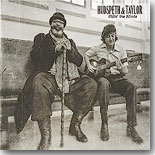 Hudspeth & Taylor’s debut album, 2019’s
Folie a
Deux, was extremely well-received and earned a
BMA nomination. For their sophomore effort,
Ridin’ The Blinds (Hudtone Records), the
duo took a dozen songs, mostly Mississippi Delta
Blues written and recorded in the 1920s and
1930s, and completely revitalized them while
retaining each tune’s classic appeal and charm. Hudspeth & Taylor’s debut album, 2019’s
Folie a
Deux, was extremely well-received and earned a
BMA nomination. For their sophomore effort,
Ridin’ The Blinds (Hudtone Records), the
duo took a dozen songs, mostly Mississippi Delta
Blues written and recorded in the 1920s and
1930s, and completely revitalized them while
retaining each tune’s classic appeal and charm.
Both Kansas City residents, guitarist Brandon
Hudspeth also leads the band Levee Town and
singer/percussionist Jaissón Taylor has been a
part of the K.C. music scene for over 30 years.
The 12 tracks range from traditional numbers
(“Poor Boy, Long Ways From Home,” “Blues In The
Bottle,” “You Gotta Walk That Lonesome Valley”)
to tunes from Mississippi Fred McDowell (“Write
Me A Few Of Your Lines”), Otto Virgial (“Little
Girl In Rome”), Skip James (“Hard Time Killin’
Floor Blues”), Memphis Willie B. (“Lonesome Home
Blues”), Blind Blake (“Police Dog Blues”), Bukka
White (“Parchman Farm Blues”), Mance Lipscomb
(“Run Sinner Run”), Muddy Waters (“Can’t Be
Satisfied”), and Big Bill Broonzy (“Hey Hey”).
The pair’s primary aim was to bring back some of
the the genre’s songs that haven’t been heard as
frequently in recent years and take the songs in
different directions, while maintaining the
melody and structure of the originals.
It’s safe
to say that their mission was accomplished. Hudspeth’s guitar work throughout the disc is
superlative, particularly his slide work.
Meanwhile, Taylor’s vocals are equally amazing
and the two complement each other so well. The
music is so good that most listeners will wish
that the album was much longer than its 39
minutes.
Ridin’ The Blinds serves as a wonderful tribute
to the early blues, while giving the songs an
updated feel. Albums such as this one not only
introduce newer blues fans to some great music,
but also encourage those listeners to track down
the original source of this classic material.
--- Graham Clarke
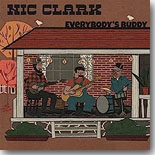 Nic Clark is a young Mexican-American musician,
and if you have not heard his amazing harmonica
skills, his warm, friendly vocals, or his deeply
personal songs, you need to give his latest
album, Everybody’s Buddy (Little Village
Foundation), a spin. Clark has had a tough life,
battling an eating disorder that saw him reach
nearly 400 pounds at one time. His songs deal
with personal struggles and provide a means of
coping with tough times, and these songs work on
listeners just as much as they have helped him. Nic Clark is a young Mexican-American musician,
and if you have not heard his amazing harmonica
skills, his warm, friendly vocals, or his deeply
personal songs, you need to give his latest
album, Everybody’s Buddy (Little Village
Foundation), a spin. Clark has had a tough life,
battling an eating disorder that saw him reach
nearly 400 pounds at one time. His songs deal
with personal struggles and provide a means of
coping with tough times, and these songs work on
listeners just as much as they have helped him.
He penned
11 of the 12 songs and he’s
backed by Charlie Hunter (who also produced the
album) on bass and guitar, drummer George Sluppick, DaShawn Hickman on pedal steel and
Wendy Hickman on backing vocals.
The opening track, “Laughing At The Rain,” puts
you in Jimmy Reed mode with Clark’s harmonica
and his optimistic lyrics and vocal. The weighty
“It’ll Be Alright” was written after Clark’s
grandmother passed away, helping him deal with the
devastation of her loss, and “Try To Understand”
finds him reflecting on dealing with the fallout
from totaling two vehicles in two years and
maintaining a postive outlook.
“Good Advice” is
the only cover on the album. Written by J.B.
Lenoir, Clark decided to craft his own version
after counsel from his grandmother when losing
his girlfriend, which was when he started his
weight loss journey. She never got to hear his
version, so he dedicates the song to her.
“Hurricanes” is also about dealing with
difficulties in life, picking yourself up and
persevering, “She’s A Fighter” tells the tale of
a couple (the wife was stricken with lime
disease, and anyone who’s had that knows the
struggles) who helped Clark with his weight
loss. “Don’t Count Yourself Out” is a cool
old-school blues shuffle that offers
encouragement.
Clark’s struggles with caffeine,
heightened by the pandemic is the subject of
“Anxiety Blues,” and the poignant “How I Met The
Blues,” written when he was 11 after the death
of his 13-year-old cousin, explains how the
youngster turned to the harmonica (and the
blues) for solace after that tragic event.
Clark helped raise his niece and nephew,
writing “Flying Blind” for her, with the first time
she heard it was on this album. The gentle track
is enhanced by Hickman’s sympathetic pedal steel
accompaniment. The title track will make
listeners smile as Clark acknowledges his
friends and what they mean to him in his
everyday life. Hickman joins in on this track as
well.
The closer, “Breathe Slow,” was written
after a friend experienced a panic attack while
driving. Clark has one of his own after he wrote
the song, so the song’s theme is a good one and
can easily apply to listeners, too.
In fact, the best counsel I can give to anyone
who’s dealing with their own issues,
“hurricanes” if you will, is to plug Everybody’s
Buddy into their media player of choice. Trust
me, Nic Clark’s gentle approach to songwriting
and performing is a source of encouragement to
those who need a helping hand. While he
considers his music “Generation Z” blues, his
songs will ring home to blues fans of all ages.
--- Graham Clarke
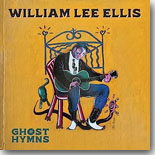 It’s been well over a decade since we’ve heard
anything from William Lee Ellis (2006’s
God’s
Tattoos). The acclaimed blues and roots
guitarist has been busy, earning a PhD at the
University of Memphis in ethnomusicology (under
blues scholar David Evans) and moving to
Vermont, where he is Chair of Fine Arts and
Associate Professor of Music at Saint Michael’s
College, teaching blues, jazz, and gospel
music. It’s been well over a decade since we’ve heard
anything from William Lee Ellis (2006’s
God’s
Tattoos). The acclaimed blues and roots
guitarist has been busy, earning a PhD at the
University of Memphis in ethnomusicology (under
blues scholar David Evans) and moving to
Vermont, where he is Chair of Fine Arts and
Associate Professor of Music at Saint Michael’s
College, teaching blues, jazz, and gospel
music.
The recording of his latest release for
Yellow Dog Records, Ghost Hymns, took over 18
months due to the pandemic, but man, was it
worth the wait!
Ellis wrote or co-wrote nine of the
12
tracks, and they cover a wide span of musical
genres, all anchored by Ellis’s exquisite guitar
work. On the lively blues which opens the disc,
“Cony Catch The Sun,” Ellis plays fretless banjo
solo, but is soon joined by Andy Cohen (dolceola),
Fraser Spears (harmonica), and Steve Feinbloom
(bass) for the jaunty “Flood Tale,” which has a
Piedmont blues feel.
“Pearl River Blues” is a
lovely acoustic blues that finds Ellis teaming
with Madagasy guitarist Mikahely, and the
exuberant traditional tune “All For You”
includes a bevy of African percussion
instruments (Koblavi Dogah plays axatse,
gankogui, clave, and conga; Fernando Barriga
plays cigar box, and Feinbloom returns on bass).
“Earth and Winding Sheet” is a haunting
instrumental featuring Ellis on guitar with
Brooke Quiggins and Ben Lively on violins, John
Dunlop on cello, and Matt LaRocca on viola (who
also did the string arrangement). The gentle
“Call On Me (An Eidolon Air)” finds Julie Coffey
joining Ellis on vocals with backing by Pete
Sutherland on fiddle, and Ellis goes solo,
playing guitar and yueqin (a Chinese stringed
instrument) on the wistful, melodic “Lost
Heaven.”
The traditional “Mumblin’ Word” gets a
rousing mountain treatment with contributions
from Neil Rossi (fiddle), Rik Palieri (banjo),
Larry Nager (bass/washboard), and backing vocals
from Nager, Coffey, and Palieri.
Koblavi returns to collaborate with Ellis on the
short but sweet instrumental “Goat Island, and
Ellis plays guitar (six and twelve-string), EBows, and aslatua on the somber “River of
Need.”
The beautiful instrumental “Belarus” was
written by Ellis’s father, Tony (a veteran of
Bill Monroe’s Blue Grass Boys), teaming Ellis
with Tom Cleary on piano. The closer, “Bury Me
In The Sky/I Don’t Feel At Home In The World
Anymore,” is a wonderful medley that includes
vocals from Kenyan singer/songwriter KeruBo,
fiddle from Hannah Assefa, and bass from Nager.
Even though it’s been nearly
17 years
since the last William Lee Ellis recording,
after listening to Ghost Hymns, it’s like he’s
never been away. Blues fans will love the blues
songs and the guitar work throughout, but anyone
who enjoys listening to beautiful music needs to
hear this album.
--- Graham Clarke
 The ever-prolific
Mick Kolassa returns with
Wooden Music (Endless Blues Records), his
14th album in ten years (plus six
digital-only releases). The most impressive
thing about Kolassa’s growing catalog is that it
remains remarkably consistent and original in
content, both lyrically and musically. Part of
this has to be due to his supporting musicians,
many of whom have played on nearly all of his
recordings --- guitarist Jeff Jensen, keyboardist
Rick Steff, and harmonica ace Eric Hughes, along
with upright bassist Carl Casperson and drummer
Tom Lonardo. The ever-prolific
Mick Kolassa returns with
Wooden Music (Endless Blues Records), his
14th album in ten years (plus six
digital-only releases). The most impressive
thing about Kolassa’s growing catalog is that it
remains remarkably consistent and original in
content, both lyrically and musically. Part of
this has to be due to his supporting musicians,
many of whom have played on nearly all of his
recordings --- guitarist Jeff Jensen, keyboardist
Rick Steff, and harmonica ace Eric Hughes, along
with upright bassist Carl Casperson and drummer
Tom Lonardo.
The rest of the contributors on this disc are a
most impressive crew as well --- harmonica players
Bob Corritore and Vince Johnson, guitarists Doug
MacLeod and Tas Cru, and vocalist Libby Rae
Watson, with background vocalists Reba Russell
and Susan Marshall. The premise behind Wooden
Music was to craft songs from scratch in an
acoustic setting to allow for more creativity.
The result of their efforts is a big, full sound
that rivals the usual electric blues album, and Kolassa has brought ten excellent songs to the
proceedings (plus one cover).
“Educated By The Blues” opens the album, as
Kolassa sings and plays kazoo and basically
tells his story of how he came to play the blues
and the many artists who influenced him along
the way, wtih Hughes on harmonica and MacLeod on
slide guitar. MacLeod also guests on the “life
lesson” tune “You Gotta Pay The Price,” and
Corritore plays harp on “Sugar In Your Grits,” a
light-hearted jab at those who venture too far
from the traditions of the blues (and grits).
Guy Clark’s “Baby Took A Limo To Memphis” teams Kolassa with Ms. Watson on vocals and she adds
plenty of sass and attitude to the tune, and “If
I Told You” is blues with a country feel and
features harmonica from Johnson.
The wistful “Hurt People” leans toward country/soul, compliments of Steff’s piano and
the background vocals of Russell and Marshall.
Steff plays accordion and Cru guests on guitar
for “Memphis Wood,” an easy-going song about
turning to music to get through the hard times.
The rollicking “If Life Was Fair” is a song that
everyone can relate to, whether they’re blues
fans or not.
On “Over My Shoulder” Kolassa
encourages us to focus on what’s ahead instead
of what’s already happened, but the hilarious
“One Hit Wonder” looks at the past and how
things do change and how we slow down over time.The country-flavored closer, “Gas Station
Sushi,” also hilarious, looks at a hook-up that
shouldn’t have been.
Wooden Music is another winner for Mick Kolassa,
with lots of great, entertaining songs and
excellent musicianship. As with all of Kolassa’s
releases, 100% of the net proceeds go to the
Blues Foundation, split between the HART Fund
and Generation Blues. Even more reason to check
out this fine album, and all of his others.
--- Graham Clarke
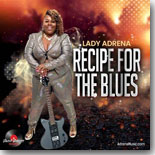 Born in Jackson, Mississippi,
Lady Adrena got her start
singing in church at age 5. She began singing
and writing Southern Soul music and released a
couple of albums over the past decade, but
recently issued a six-song EP on Sweet Success
Records. Recipe For The Blues features
production support from Castro “Mr. Sipp”
Coleman, Dexter Allen, Gene Munns, and Bo “Big
Bo” Richardson. Although there’s no listing of
contributing musicians on the release, five of
the six tracks were written by Lady Adrena, one
by Munns. Born in Jackson, Mississippi,
Lady Adrena got her start
singing in church at age 5. She began singing
and writing Southern Soul music and released a
couple of albums over the past decade, but
recently issued a six-song EP on Sweet Success
Records. Recipe For The Blues features
production support from Castro “Mr. Sipp”
Coleman, Dexter Allen, Gene Munns, and Bo “Big
Bo” Richardson. Although there’s no listing of
contributing musicians on the release, five of
the six tracks were written by Lady Adrena, one
by Munns.
The opener, “Blues Chose Me,” produced by
Richardson, is autobiographical, as Adrena tells
her tale of how she went from singing in church
to singing the blues. Her vocals are strong and
the musical support works well.
The blues ballad,
“Borrow My Pans,” one of three produced by
Allen, show the sweet and tender side of Adrena’s vocals, and “Traveling Woman,” also
produced by Allen, is a spunky urban blues, with
sharp lead guitar work complementing Adrena’s
robust vocal.
Mr. Sipp produced “Good Girl Gone Bad,” an
upbeat R&B-flavored blues that also features
crisp guitar work in support of Adrena’s sassy
delivery. The Allen-produced “No Ring No
Thing” reminds me of those classic southern soul
tracks on the radio in the late ’80s, with its
bouncy arrangement and horns, plus background
singers. The title track, penned by Munns (who
also produced the track), is a soulful blues
ballad that Adrena knocks out of the park.
Despite four producers, the six tracks are a
seamless fit. The common factor, of course, is
Lady Adrena, who possesses a great set of pipes
and a knack for writing catchy tunes. No doubt
she has the Recipe For The Blues, and hopefully,
she will give her a even bigger helping next
time around.
--- Graham Clarke
 Reverend
Freakchild’s 17th release, Songs of
Beauty For Ashes of Realization (Treated and
Released Records), finds the good Reverend
revisiting nine of his favorites songs from his
22 years of recording, giving each a new fresh
interpretation with a little help from his
friends, which include G. Love, Hazel Miller,
drummer Chris Parker, guitarist Chris Bergson
and Mark Karan, multi-instrumentalist Hugh Pool,
and The Reverend Shawn Amos. Reverend
Freakchild’s 17th release, Songs of
Beauty For Ashes of Realization (Treated and
Released Records), finds the good Reverend
revisiting nine of his favorites songs from his
22 years of recording, giving each a new fresh
interpretation with a little help from his
friends, which include G. Love, Hazel Miller,
drummer Chris Parker, guitarist Chris Bergson
and Mark Karan, multi-instrumentalist Hugh Pool,
and The Reverend Shawn Amos.
Longtime fans realize that the Reverend is
constantly revamping and revising his material
(including one CD of a 3-CD album – 2016’s
Illogical Optimism – that featured multiple
revisions of one song, another version of which
is included on this new album), so they already
know that much fun lies ahead.
The
opener, “All I Got Is Now,” was the song that
the Reverend devoted an entire CD to multiple
interpretations, and this version may be my
favorite, a funky blues that adds B3 and an
extra set of drums to the mix, with Hugh Pool
also playing lap steel and the Rev breaking out
the National Resonator. “Dial It In” was the
title track to his 2018 release and retains the
funky feel of the original, but adds extra
percussion. While I didn’t hear the previous
version of “All Across America” (from 2010’s
God Shaped Hole), this rollicking number is
a keeper for sure, a great driving song, and
“Hippy Bluesman Blues” is a cool blues with a
psychedelic feel, as you might imagine based on
the title.
“Amsterdam Blues,” from the Rev’s debut release
in 2001 (Blues & Spirituals) is a superb,
moody country blues, just the man and his
acoustic guitar. “Tears of Fire” was originally
recorded as a lo-fi guitar and drums duet on
2015’s Hillbilly-Zen-Punk Blues, but this
version is definitely high-fidelity with
scorching lead guitar from Chris Bergson and
thunderous drum work from Chris Parker.
Originally a country-flavored long song,
“Skyflower (Watermoon)” is greatly expanded with
strings and backing vocals from Sheryl Renee.
The
Rev is joined by another Rev, The Reverend Shawn
Amos, who adds harmonica and vocals to Reverend
Freakchild’s vocals and resonator guitar on
“Don’t Miss Nothing ‘til It’s Gone,” a splendid
country blues. The grand finale, “Keep On
Truckin’,” actually pays tribute to two of
Reverend Freakchild’s influences --- country
blues legend Blind Boy Fuller and The Grateful
Dead, who were a big influence on the Rev’s
musical vision of merging blues, country, folk,
rock, and soul.
I
truly never know what to expect when I crank up
a new Reverend Freakchild, but I do know a
couple of things. The first thing is that it
will never be a dull listening experience and
the second is that it will always be fascinating
and ultimately rewarding listening. Songs of
Beauty For Ashes of Realization is no
exception to the rule.
---
Graham Clarke
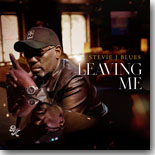 Jackson, Mississippi-based soul-blues man
Stevie J Blues
lives up to his name with the slow burner
“Leaving Me,” an interesting twist on the
traditional break-up song. The song itself mixes
blues, funk, and soul seamlessly, adding some
fierce Ernie Isley-like guitar riffs throughout
the track, which gives the tune a sharp edge,
along with the lyrics, which as stated above,
make this song stand out among your average
break-up tune. It’s a welcome addition to the
busy blues man’s ever-growing catalog. Jackson, Mississippi-based soul-blues man
Stevie J Blues
lives up to his name with the slow burner
“Leaving Me,” an interesting twist on the
traditional break-up song. The song itself mixes
blues, funk, and soul seamlessly, adding some
fierce Ernie Isley-like guitar riffs throughout
the track, which gives the tune a sharp edge,
along with the lyrics, which as stated above,
make this song stand out among your average
break-up tune. It’s a welcome addition to the
busy blues man’s ever-growing catalog.
--- Graham Clarke
 It's
been a good month for new albums representing
artists that were previously unfamiliar to me. I
wrote all about D.K. Harrell's debut disk in our
Pick Hit.
I should have already known about Nigel Mack,
a Canadian artist who wound up in Chicago to
continue his blues career, considering that
Back In Style (Blues Attack Records) is his
fourth release. It's
been a good month for new albums representing
artists that were previously unfamiliar to me. I
wrote all about D.K. Harrell's debut disk in our
Pick Hit.
I should have already known about Nigel Mack,
a Canadian artist who wound up in Chicago to
continue his blues career, considering that
Back In Style (Blues Attack Records) is his
fourth release.
Each
of the dozen songs on Back In Style are
originals, a solid mix of Chicago blues styles.
Mack plays both harmonica and guitar, but I
believe it's on the blues harp where he really
shines. That and his powerful vocals, drawing
comparisons to the rich, full voice of Curtis
Salgado.
Mack
(who's real last name is McKenzie, but we'll
stick to his stage name here) shows his
harmonica skills right away on the mid-tempo
blues "Travelin' Heavy." It's not so much his
luggage that's weighing him down, but more the
emotional baggage he's carrying. Darryl Coutts
chips in with a fine solo on the Hammond B-3.
Mack switches to guitar for "Highway 69," laying
down some intense Elmore James-style slide
guitar licks throughout the song.
"Damn You Mr. Bluesman" tells the story about
how this particular blues fan starts to fall in
love every time he hears the blues, blaming the
messenger for making him fall in love with a
woman half his age. It's a fun, funky mid-tempo
blues. The mood changes on the snaky blues "Cold
Comfort," taking place in Las Vegas as he
laments that the woman needs the dice more
than she needs him.
Pianist Neal O'Hara shines on the blues shuffle
"Graveyard Gate, made more robust with the big
sounds of the horn section. The title cut is
another fun, feelgood tune that gets funky as
Mack sings that he is "... so glad that love is
back in style ..." There's nice interplay
between guitar and harmonica, both done by Mack.
"Redemption"
is the album's only instrumental number, a slow
spooky blues highlighted by Mack's slide guitar,
and then we get more nice slide the up-tempo
blues "A Place To Call Home." Mack goes it alone
on the acoustic gem "Blues Enough For You," as
he accompanies his vocals with a 1929 National
steel guitar and a Martin acoustic guitar, while
knocking out the rhythm with foot stomps.
"Shangri-La Girl" is a happy, danceable foot
stomper with a very hot piano solo from O'Hara,
while Mack gives us a feel of the Southwest on
"Jalapeño Peppers," with O'Hara driving the song
with propulsive piano to complement Mack's slide
guitar.
Closing this wonderful album is a mid-tempo
blues head-bopper, "Just One Man," with Mack
showing even more power in his voice. A nice
finish.
Hearing this album from Nigel Mack compelled me
to go in search of some of his early work, so
now I've got some listening to do. If this is
also your introduction to the man's music,
Back In Style is a good place to start.
--- Bill Mitchell
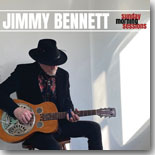 Jimmy
Bennett's inspiration for the music on
Sunday Morning Sessions (Junkyard Dog
Productions) came about during the COVID
pandemic in 2020 when he posted a Facebook video
on Easter morning of that year. He continued
those Sunday morning sessions throughout the
time that we were all confined to our homes, and
now those Sunday morning sessions have
progressed into this fine album of mostly
Piedmont-style fingerpicking blues. It's mostly
Bennett's show, except when producer John Ginty
hops in on vintage vibe piano, Hammond organ, or
drums. Jimmy
Bennett's inspiration for the music on
Sunday Morning Sessions (Junkyard Dog
Productions) came about during the COVID
pandemic in 2020 when he posted a Facebook video
on Easter morning of that year. He continued
those Sunday morning sessions throughout the
time that we were all confined to our homes, and
now those Sunday morning sessions have
progressed into this fine album of mostly
Piedmont-style fingerpicking blues. It's mostly
Bennett's show, except when producer John Ginty
hops in on vintage vibe piano, Hammond organ, or
drums.
Bennett shows off his acoustic guitar skills on
the opening instrumental, "Easter Morning
Melody," with gentle and tasteful Piedmont-style
guitar work. Another instrumental, "Snow
Sliding," has Bennett using a slide to good
effect while he gets a percussion sound from his
foot tapping. Very nice.
Eight of the ten cuts were written or co-written
by Bennett, but one of my favorites is the
version of Johnny Cash's "Ring Of Fire." Imagine
this classic with fingerpicking acoustic guitar
backing. Bennett has a pleasant voice, putting a
little more power behind his voice to get a
little Johnny Cash into it. The other cover is
the Delbert McClinton / Tom Faulkner composition
"New York City," on which he's joined by Ginty
to give it a fuller sound. On this tune he sings
about driving from San Diego all the way to the
Big Apple.
I
prefer Bennett's vocals on his own "Mr.
Charlie," as it's obvious that he's having fun
with this tune, while "Will I See You Again"
moves his voice further up in the mix, with just
a hint of echo. One of the highlights here. The
same effect comes across on "Katy Mae," with
more depth to his vocals over top of some really
nice slide guitar playing.
Closing the album is "Serenade For New Orleans,"
with very nice slide guitar work, detailing his
lament about losing some of the cultural history
of the Big Easy.
Sunday Morning Sessions is a pleasant album
that's easy on the ears, with some very fine
music here. Hearing Mr. Bennett's exquisite
fingerpicking guitar takes me back to the days
when I lived on the East Coast where that style
is more prevalent. Good memories.
--- Bill Mitchell
|